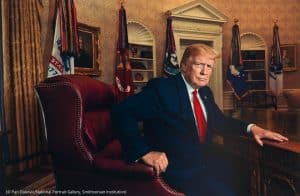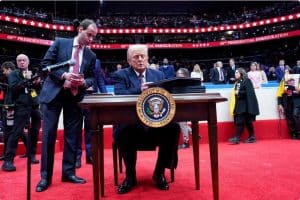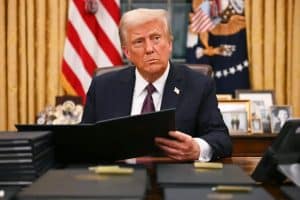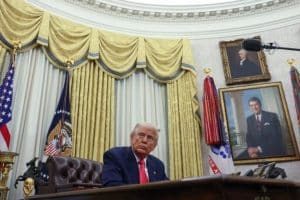One hundred days into his second term, President Donald Trump has signed over 130 executive orders, declared multiple national emergencies, and launched aggressive moves to reshape the federal government — setting off alarm bells for legal scholars and constitutional experts.

“Government by executive order” is how some describe Trump’s approach. In a symbolic move just hours after his inauguration, Trump signed his first orders before a cheering crowd at Capital One Arena. He froze agency regulations authorized by Congress and withdrew the U.S. from an international climate pact.

“You’re witnessing the dawn of the golden age of America,” he told supporters.
But critics say his sweeping use of power goes far beyond what’s been seen in modern American history.

Executive Power on Overdrive
Trump’s daily executive actions — often signed for the cameras in the Oval Office — exceed any president’s first 100 days in nearly 90 years. His administration has fired thousands of civil servants, dismantled diversity and inclusion initiatives, and moved to gut agencies like the Department of Education.

He’s even attempted to end birthright citizenship — a constitutional right guaranteed by the 14th Amendment.
David Schultz, a constitutional law expert at Hamline University, put it bluntly: “He’s trying to govern entirely by executive order on a whole range of issues.”
Trump defends his actions as the rightful use of presidential authority. In a recent interview with Time, he said: “I don’t feel I’m expanding it. I think I’m using it as it was meant to be used.”
But others aren’t convinced.
“This really is unprecedented,” said Elizabeth Goitein of the Brennan Center for Justice. “We’ve seen expansive views of presidential power before, especially after 9/11 — but this is something else entirely.”
National Emergencies and Questionable Legal Moves
To push forward his immigration and trade agenda, Trump has invoked obscure or controversial powers. He used the 1798 Alien Enemies Act to deport hundreds of Venezuelan migrants — labeling them gang members and bypassing normal legal process. He tapped the 1977 International Emergency Economic Powers Act to impose sweeping tariffs, despite Congress’s clear authority over taxation and trade.
Goitein called these moves legally shaky and possibly unconstitutional.
Some of the president’s actions appear retaliatory. He ordered investigations into former administration officials who criticized him — including Chris Krebs and Miles Taylor — and targeted law firms that represented political opponents.
He’s also expressed admiration for authoritarian leaders like Xi Jinping, Vladimir Putin, and Viktor Orbán. Last fall, in a Fox News interview, Trump said, “Sometimes you need a strongman.”
Congress Remains Largely Silent
Despite Republican control of both chambers, Congress has offered little resistance. Most GOP lawmakers appear unwilling to challenge Trump publicly.
“We’re all afraid,” admitted Sen. Lisa Murkowski of Alaska, one of the few Republicans willing to speak out. “Retaliation is real.”
The Founders envisioned Congress as a check on executive overreach. But in this moment, partisanship may be overshadowing constitutional duty.
Courts Push Back — Cautiously
The judiciary has been the main line of resistance. Trump has slammed judges who ruled against him, calling them “radical left,” and even suggested ignoring lower court rulings — though later said Supreme Court decisions would be respected.
In a rare statement, Chief Justice John Roberts pushed back on Trump’s rhetoric, defending judicial independence without naming the president directly.
Last week, tensions escalated further. The FBI arrested Milwaukee judge Hannah Dugan, alleging she interfered with immigration agents. Her lawyer vowed she would “vigorously defend herself.” The White House didn’t rule out more actions against judges, even Supreme Court justices, under similar claims.
“He thinks he can either ignore or bully his way through,” said Schultz. “And so far, he’s had mixed results.”
A Warning for Democracy
Legal experts warn that Trump’s aggressive tactics may strain — or even break — the system of checks and balances.
“The separation of powers is the most important safeguard we have against a president becoming a king,” said Goitein. “If this is the new normal, then we can say goodbye to democracy.”
As Trump’s second term pushes forward, the courts are bracing for more legal battles — and the nation is left to reckon with what kind of presidency this truly is.



